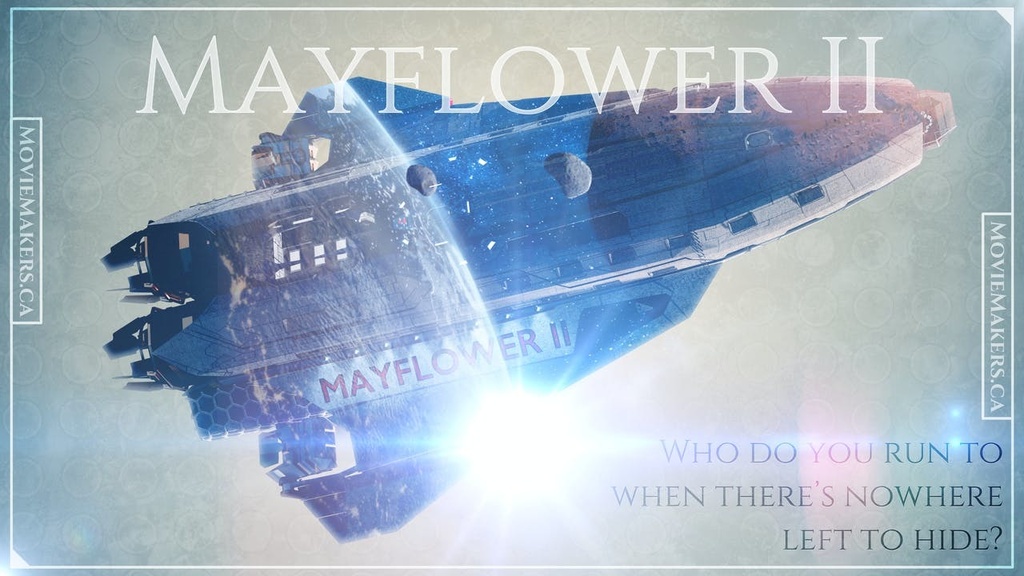
"Mayflower II" a Movie Review
Mayflower II presents a not-too-distant future in which an overbearing government uses the threat of Climate Change to justify a statist tyranny over all of North America—complete with catchy slogans (“Join the Green Team and Preserve the Planet”). A “Dept. of Sustainable Development” cracks down on all dissenters, and especially on Christians. Go ahead, tell me that’s hard to believe.

- Lee Duigon
Amateur actors from the Canadian Badlands Passion Play, volunteer technicians, a Christian science fiction story line, and a mere $30,000 budget—put them all together and make a movie!
Mayflower II, by the Lammiman family (Greg Lammiman, screenplay, and Dallas Lammiman, director), would have cost Hollywood $100 million to make and wouldn’t have been any better. But here, for just a few thousand dollars, we get an engaging and watchable science fiction movie: and even better, a dystopian story that takes an unexpected turn towards … hope.
You won’t be able to see it in the theaters, but for $15 you can order the DVD at https://www.mayflowerii.com/.
When Is Dystopia Not Dystopia?
Mayflower II presents a not-too-distant future in which an overbearing government uses the threat of Climate Change to justify a statist tyranny over all of North America—complete with catchy slogans (“Join the Green Team and Preserve the Planet”). A “Dept. of Sustainable Development” cracks down on all dissenters, and especially on Christians. Go ahead, tell me that’s hard to believe.
The protagonist, Miles, is an electronics engineer who just wants to get along, “We just want a safe and happy life!” His brother, Rich, is a Christian: and he and his fellowship have to meet in secret, in cells, to read and study the real Bible as opposed to the watered-down government edition. Meanwhile, the government is in bed with anarchists, bombs go off, and all the turmoil and terror is blamed on the Christians.
In a desperate bid to live in freedom, Christians have secretly acquired a spaceship; and, like the Pilgrims in the original Mayflower, they mean to put their trust in God and leave the earth as “wanderers in the stars,” seeking a haven of peace and liberty.
There’s no alternative. Government grows more oppressive by the day, it uses public education to turn children against their families, and it has a “collective” and “sustainable” colony on Mars where slave labor works the mines and no one is allowed to leave.
As people ask, “How can all those scientists be wrong?” and the government issues incessant warnings against “unsustainable family” (they want to control the population), where does the hope come in?
Well, that’s what the movie’s all about, and we mustn’t publish spoilers.
It Looks Great!
The thing that gets me about this movie is, it looks great. There’s excellent music to accompany convincing sets and special effects—including invisibility cloaks that look like they really work. I can’t imagine how they did it on such a modest budget. Remember, it’s all the work of amateurs and volunteers—several years’ worth of it, and all out of their own pockets. Hollywood, take note! It appears we don’t need your studios anymore: people have learned how to make good movies without them.
The only quibble, if you can call it that, is that much of the dialogue tends to be rather heavy-handed. One might argue that it had to be, to get the point across. The story’s villains stop short of wearing sandwich boards announcing “We Are Villains,” but do come uncomfortably close to it.
But then we’re already in an age, at least in Canada, in which academic screwballs invent new pronouns to replace “he” and “she” and “him” and “her,” with a prime minister who seems receptive to the idea of prison terms for anyone who refuses to use them. So how subtle would we want to make this movie’s dialogue? The abuses that are already going on in real life are anything but subtle. And the movie came out before America’s 2020 presidential election—which has raised heavy-handed villainy to a higher level than ever seen in North America.
The sets, the effects, and the music do much to soften the awkwardness of the dialogue. You can enjoy just watching the movie: Mayflower II is easy to believe in because it looks so believable.
Back in 2012 we reviewed another movie by the Lammiman family, Remember. Mayflower II is a little more ambitious, artistically, but Remember was quite good, too.
We hope the Lammimans will make another.

- Lee Duigon
Lee is the author of the Bell Mountain Series of novels and a contributing editor for our Faith for All of Life magazine. Lee provides commentary on cultural trends and relevant issues to Christians, along with providing cogent book and media reviews.
Lee has his own blog at www.leeduigon.com.